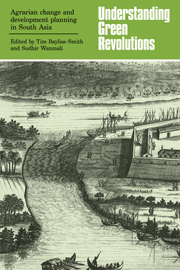Book contents
- Frontmatter
- Contents
- List of contributors
- Preface
- I Understanding Green Revolutions: an overview
- 1 The agricultural revolution in Western Europe
- 2 Land reform as a pre-condition for Green Revolution in Latin America
- 3 Frogs and farmers: the Green Revolution in India, and its murky past
- 4 Agrarian change and the Merchant State in Tamil Nadu
- II Agrarian change at village level
- III Development planning and agrarian change
- Index
4 - Agrarian change and the Merchant State in Tamil Nadu
Published online by Cambridge University Press: 25 May 2010
- Frontmatter
- Contents
- List of contributors
- Preface
- I Understanding Green Revolutions: an overview
- 1 The agricultural revolution in Western Europe
- 2 Land reform as a pre-condition for Green Revolution in Latin America
- 3 Frogs and farmers: the Green Revolution in India, and its murky past
- 4 Agrarian change and the Merchant State in Tamil Nadu
- II Agrarian change at village level
- III Development planning and agrarian change
- Index
Summary
In this chapter I analyse agricultural mercantile policy in Tamil Nadu State in South India. I do not consider the originally intended effects of mercantile policy. Rather I consider the way in which policy has actually been implemented. As Schaffer (1981, p. 32) suggests, ‘Public policy is, after all, what it does. The point is to explain what that is, and then see if that explanation can be an instrument for change and improvement.’
My approach has been to examine the way in which institutional decisions about the sphere of exchange alter the mobilisation, distribution and use of resources in Indian society. These resources I have disaggregated so far as possible into four types: commodities, physical infrastructure and technology, finance, and labour. I have examined each state intervention in isolation, and also in relation to others and to ‘civil society’ (Harriss, 1983). The concept of state which I have used is not, therefore, the all-encompassing Althusserian one, that where power exists there is the state, but a more limited one, consisting of the creators and executors of public policy: that part of the economy involved in the mobilisation and distribution of public resources.
Methodology
I have examined each implemented intervention by the State at the level of aggregation, spatial and administrative, at which the policies motivating it have been conceived. I have then examined each intervention as it exists in one, long-commercialised, dryland region, part of Coimbatore District in Tamil Nadu State.
- Type
- Chapter
- Information
- Understanding Green RevolutionsAgrarian Change and Development Planning in South Asia, pp. 53 - 84Publisher: Cambridge University PressPrint publication year: 1984
- 4
- Cited by



